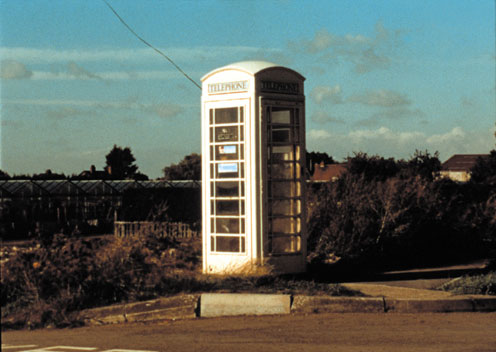By Tara Judah
Our narrator (Paul Scofield) returns. Pairing himself once more with Robinson, this time commissioned to study (or sleuth) England, the examination of space moves ever so slightly from the psychogeographic to the ideological.
Robinson is living in Reading, a mere twenty minutes by train from the pulsating palimpsest of Patrick Keiller’s first film, London. Though he harbours a fear of provincial England (a symptom all Londoners suffer), he is heartened to be among deregulated routemaster buses. The London icon, perhaps a romantic inclusion for Keiller when he made the film, is also one of the most politically charged London signifiers for any modern-day viewer. Phased out in the poorer boroughs by Ken Livingstone in favour of the “bendy buses” – where those who could not afford bus fare were able to ride for free (an unofficial socialist policy), and then brought back as a stooge in Boris Johnston’s novelty campaign, the routemaster has throughout the 2000s become a space for political bickering; for occupational health and safety as well as the most cynical of Tory and tourist exploitation.
From just outside of London in the West, at the world’s busiest airport, Heathrow, to where the Tolpuddle Martyrs famously fought and were persecuted for want of a living wage, stopping all the while at Tesco’s for sandwiches, restrooms and fuel in the strangest, sometimes Tudor-esque buildings, this is indeed a cartographical endeavour full of contradiction and charted by capitalism.
Curiously, though this travelogue is far more concerned with the effect of political parties and economic structures than London ever was, Keiller maintains his distance from any anthropological study or a human geography of the landscape in decline. That’s not to say that he doesn’t engage with the idea of its effect on the populous. Rather, those people are either imagined class representatives, historically recorded protagonists or famous writers who lived in or visited the places we are shown and told about.
The story that unfolds onscreen is very different to what a tourist’s view of England might be; rolling hills are replaced by landfill sites and factories. Quaint villages and cosy pubs are rarely seen and instead we are confronted with large shopping mall complexes and endless motorways – those charming B roads never in sight.
England looks cold though it is clearly captured in the summer or spring. The conservative underbelly of the mindless middle classes finally reveals itself; a faceless entity, in defence of private property and consumer capitalism. Birds chirrup and sing in a continuous sound recording that seamlessly takes us from one location to the next. The transitions are smooth and the result is a presumed comprehension of the English landscape – as if such a thing might exist.
Robinson and our narrator grow physically ill owing to a diet of convenience foods from rest stops. The findings here are grim: mass produced foods poison the people of England just as the nation’s politics poison its economic, environmental and social infrastructure.
